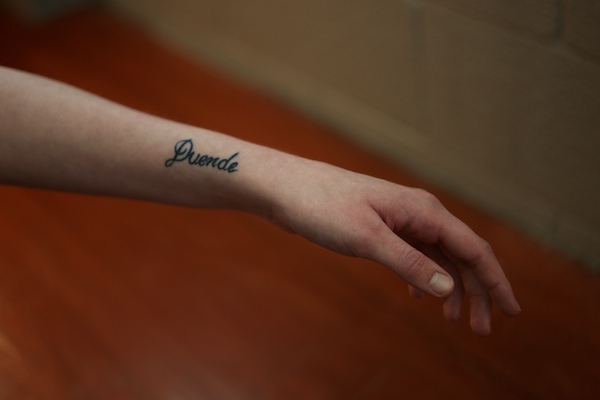Duende
Glendyn Ivin
Last week I was in New Zealand casting for a commercial. I met a 17 year old girl who had the word 'Duende' freshly tattooed on her arm. Later, I googled the word and found it's meaning fascinating. A wonderful word which goes some way towards describing the indescribable. The elusive, beautiful darkness we are drawn to in music and film and all art in general. I never knew it even had a word to describe it.

Australian music artist Nick Cave discusses duende in his lecture pertaining to the nature of the love song (Vienna, 1999):
In his brilliant lecture entitled "The Theory and Function of Duende" Federico García Lorca attempts to shed some light on the eerie and inexplicable sadness that lives in the heart of certain works of art. "All that has dark sound has duende", he says, "that mysterious power that everyone feels but no philosopher can explain." In contemporary rock music, the area in which I operate, music seems less inclined to have its soul, restless and quivering, the sadness that Lorca talks about. Excitement, often; anger, sometimes: but true sadness, rarely, Bob Dylan has always had it. Leonard Cohen deals specifically in it. It pursues Van Morrison like a black dog and though he tries to he cannot escape it.Tom Waits and Neil Young can summon it. It haunts Polly Harvey. My friends the Dirty Three have it by the bucket load. The band Spiritualized are excited by it. Tindersticks desperately want it, but all in all it would appear that duende is too fragile to survive the brutality of technology and the ever increasing acceleration of the music industry. Perhaps there is just no money in sadness, no dollars in duende. Sadness or duende needs space to breathe. Melancholy hates haste and floats in silence. It must be handled with care."
All love songs must contain duende. For the love song is never truly happy. It must first embrace the potential for pain. Those songs that speak of love without having within in their lines an ache or a sigh are not love songs at all but rather Hate Songs disguised as love songs, and are not to be trusted. These songs deny us our humanness and our God-given right to be sad and the air-waves are littered with them. The love song must resonate with the susurration of sorrow, the tintinnabulation of grief. The writer who refuses to explore the darker regions of the heart will never be able to write convincingly about the wonder, the magic and the joy of love for just as goodness cannot be trusted unless it has breathed the same air as evil - the enduring metaphor of Christ crucified between two criminals comes to mind here - so within the fabric of the love song, within its melody, its lyric, one must sense an acknowledgement of its capacity for suffering. [via wiki]